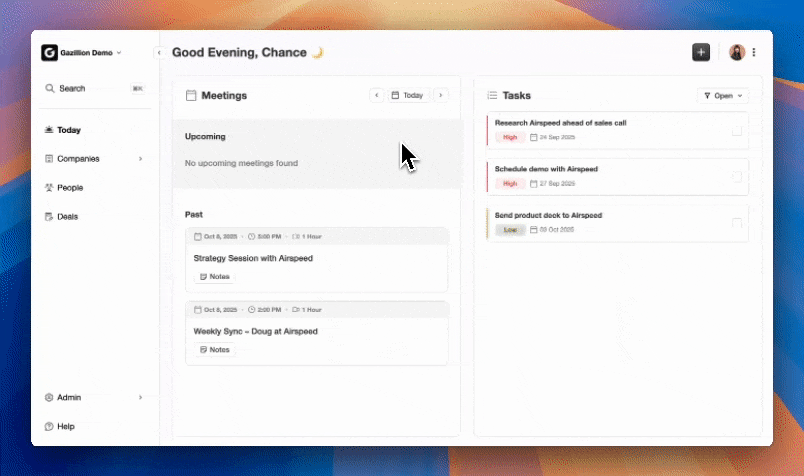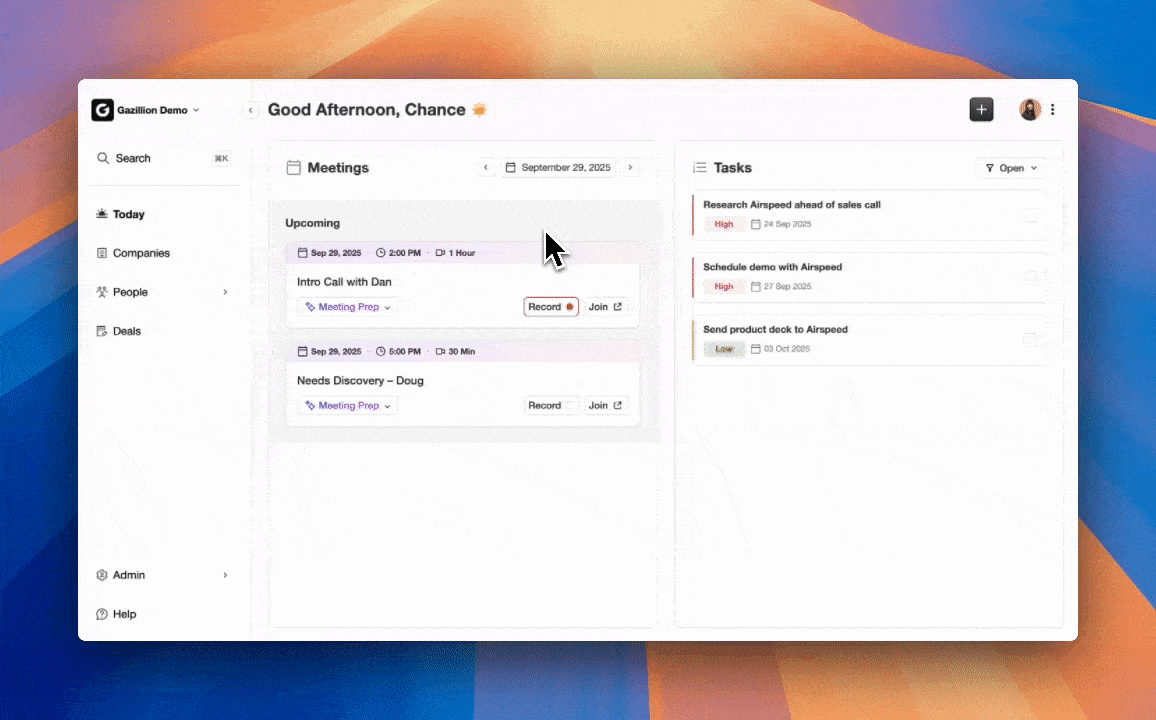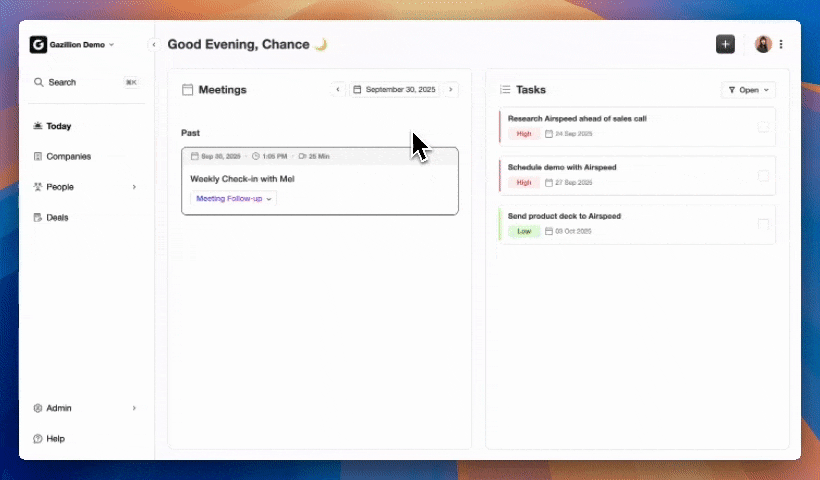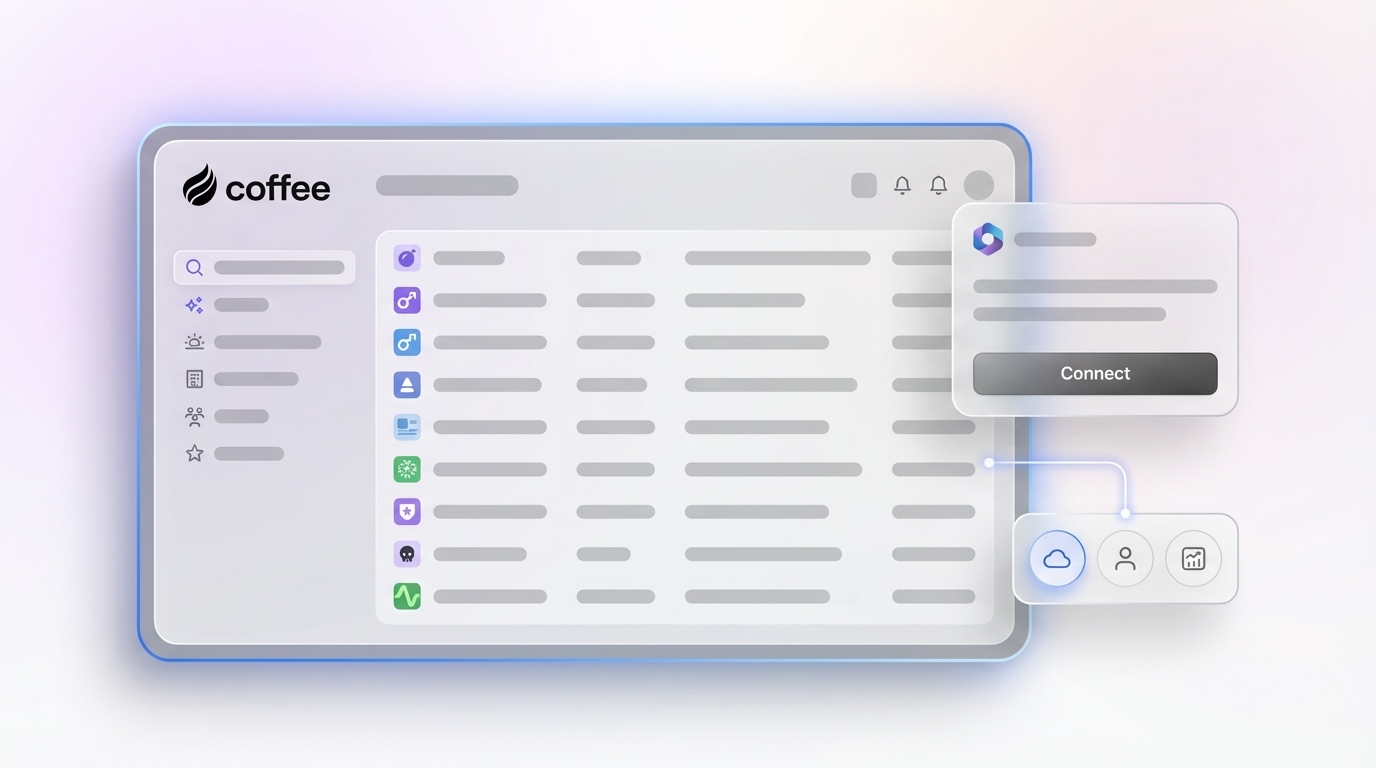Key Takeaways
- Growing startups often outgrow manual, form-based CRMs that demand heavy data entry and hurt sales productivity.
- Agent-driven CRMs automatically capture and structure data from email, calendar, and meetings, which reduces admin work and improves data quality.
- High-quality, always-current CRM data supports more accurate forecasting, clearer pipeline reviews, and better revenue decisions.
- Startups can introduce agent-driven CRM in stages, either as a primary system or as a companion layer on top of an existing CRM.
- Coffee provides an agent-driven CRM and companion app that automates CRM tasks and lets teams focus on revenue. Get started with simple, seat-based pricing.
Why Traditional CRMs Fail Startups: The Cost of Manual Labor
The Promise vs. Reality of Legacy CRMs
Customer Relationship Management software aims to act as a central system for growth. In many startups, legacy CRMs become systems that need constant manual updates instead of helping teams sell. These tools assume that busy sales reps will always enter complete, accurate data, which rarely matches reality.
Fragmented Data and Workflow: The Hidden Costs
Sales teams now work across many tools for contact data, enrichment, outbound sequences, and call recording. Reps often move between tabs to piece together context for a single deal. This constant switching slows down work and increases the risk that key details never reach the CRM.
For small teams, this effect is pronounced. Time that could go to prospecting or closing deals turns into a series of repetitive admin tasks.
The Manual Data Entry Grind: A Productivity Drain
Internal Coffee market data shows that 71% of sales reps report spending too much time on data entry, and only 35% of their time on active selling. That imbalance creates a loop where low adoption leads to poor data, which reduces trust in the CRM and pushes teams toward side systems like spreadsheets or personal notes.
Outdated Architecture and Poor Data Quality
Many older CRMs were built for structured fields and simple objects. Modern sales work generates unstructured data such as long email threads, call transcripts, and meeting notes. Systems that cannot ingest and organize this information lose context over time.
Basic relational databases also tend to overwrite historical values when fields change. Startups then lose a clear record of deal evolution, contact role changes, and other signals that matter for forecasting and strategy.
The Agent Inflection Point: Introducing the Future of Startup CRM
From Passive Databases to Active CRM Agents
Recent advances in AI now allow CRMs to move from passive systems of record to active agents. Instead of waiting for humans to fill forms, an agent listens across communication channels, captures data, and updates records. The CRM starts to act like a reliable teammate that handles repetitive work in the background.
Coffee’s AI-First Philosophy: “Good Data In, Good Data Out”
Coffee focuses on building a strong data layer first. The agent connects to email, calendars, and call transcripts, then structures that information into clean, linked records. This approach supports more accurate forecasts, cleaner pipeline reviews, and better reporting without extra work from reps.

Core Value Proposition: How the Coffee Agent Supports Revenue
- Data entry is handled by the agent. Coffee automatically creates and enriches contacts, companies, and activities across email and calendar. Many teams recover 8–12 hours per rep each week because the agent unifies structured and unstructured data into complete records.
- Meeting workflows are supported end-to-end. The agent prepares pre-meeting briefings with attendee context, then drafts post-meeting summaries, action items, and follow-up emails that reps can edit and send.
- Pipeline intelligence is built on reliable data. With accurate, timely activity data, Coffee tracks pipeline changes automatically and reduces the need for manual reporting and spreadsheet work.
- Revenue Stack simplified. Coffee can cover core needs such as CRM, enrichment, recording, and forecasting, which helps startups reduce tool sprawl and cost.
- Rep experience improved. Reps spend less time filling forms and more time in conversations. As the agent handles repetitive tasks, adoption rises, and CRM data quality improves.
Get started with Coffee’s agent-driven CRM to shift your team from admin work to selling.
Crucial CRM Features for Startup Success
Automated Data Capture and Enrichment
Startups benefit from CRMs that stay up to date without manual effort. Coffee’s agent connects to Google Workspace or Microsoft 365, scans emails and calendars, and builds contact and company profiles as conversations happen. It enriches records with details such as job titles, funding data, and LinkedIn profiles through licensed partners, which reduces the need for separate enrichment tools.
Automatic activity logging keeps a complete interaction history, so leaders can review deals without asking reps to backfill notes.
Intelligent Meeting Management
Modern CRMs add value when they support meetings directly. Coffee’s agent prepares concise briefings with attendee roles, recent activity, and open items. During calls, an AI bot records and transcribes meetings across Zoom, Microsoft Teams, and Google Meet.
After the meeting, the agent generates summaries, highlights next steps, and drafts follow-up emails in Gmail for review and editing. It structures notes using frameworks like BANT, MEDDIC, or SPICED, which produces consistent, comparable data across deals.

Predictive Pipeline Intelligence
Accurate forecasting depends on complete, timely data. With an agent maintaining the record, leaders can rely more on the numbers and less on manual status updates.
Coffee’s Pipeline Compare feature shows week-over-week changes in pipeline, surfaces deals that moved forward or stalled, and supports focused pipeline reviews. A natural language list builder also lets users request targeted segments, such as VPs of Sales in North America at companies above a funding threshold using specific CRMs, and the agent assembles the list using integrated enrichment.
Scalability and Integration Architecture
Startup CRMs need room to grow without becoming hard to manage. Coffee integrates with other tools via Zapier today, with deeper native integrations on the roadmap. The agent normalizes data from multiple sources, which makes it easier to keep a single, consistent view of accounts and deals even in a multi-tool stack.
Coffee’s Agent-Driven CRM Options for Startup Growth
Standalone AI-First CRM
Smaller companies with roughly 1–20 employees often move from spreadsheets into their first real CRM. Coffee offers an agent-powered platform for this stage that automates data management, meeting workflows, and basic pipeline intelligence with a straightforward setup.
Companion App for Existing CRMs
Startups that already use a CRM can add Coffee as an agent layer. This companion app handles data capture and enrichment, then syncs information back into the existing system. Teams keep their current workflows while improving data quality and reducing manual entry.
Comparison: Traditional CRMs vs. Coffee’s Agent-Driven Approach
|
Feature Category |
Traditional CRMs |
Coffee Agent-Driven |
Impact on Startups |
|
Data Entry |
Manual, time-consuming |
Automated by an agent |
8–12 hours saved per rep weekly |
|
Data Quality |
Prone to human error |
High-quality, ground-truth |
Supports accurate forecasting |
|
Rep Experience |
Heavy administrative burden |
Supportive co-pilot |
Higher adoption and better outcomes |
|
Insights and Forecasting |
Manual and often incomplete |
Automated and data-rich |
More informed revenue decisions |

Implementing Your Agent-Driven CRM: A Practical Roadmap
Define Requirements and Align Stakeholders
Clear requirements give your rollout a stable foundation. For most startups, priorities include automated data capture, a simple interface, and room to scale. Include integration needs, security expectations, and budget in that list.
Bring in sales, marketing, and operations leaders to map current workflows and highlight pain points. This review helps identify where automation will deliver the fastest impact. Agent-driven tools like Coffee often fit into existing processes with fewer changes than traditional CRMs.
Run a Pilot and Roll Out in Phases
Start with a small group of users to test real workflows. Coffee has a quick setup experience. Teams connect to Google Workspace or Microsoft 365, then the agent begins capturing data from live activity.
During the pilot, track indicators such as time saved on admin work, the number of contacts created automatically, and improvements in pipeline visibility. Use those findings to refine processes before a broader rollout.
Measure Success and Address Concerns
Define a short list of success metrics, such as a higher share of rep time spent selling, more complete opportunity records, or better forecast accuracy. Coffee’s Pipeline Compare feature offers a clear view into how deals move over time.
Security often sits at the center of stakeholder questions. Coffee is SOC 2 Type 2, and GDPR compliant, and customer data is not used to train public AI models. Integration today runs through Zapier, with additional native integrations planned as needs grow.
Get started with Coffee’s agent-driven CRM to reduce manual CRM work and improve revenue visibility.
Future-Proof Your Startup with Agent-Driven CRM
The CRM market continues to move toward systems that capture and interpret data on their own. Manual, form-based tools sit at a disadvantage compared with agent-driven platforms that maintain data quality and turn activity into insight.
Coffee helps startups treat CRM as a revenue asset rather than a reporting obligation. As more companies adopt agent-driven CRM in 2026 and beyond, teams that still rely on manual updates may find it harder to keep pace in data-driven markets.
Explore Coffee’s agent-driven CRM to reduce manual work today and support your next stage of growth.
Frequently Asked Questions about CRM for Startups
How much data entry can an agent-driven CRM automate?
Coffee’s agent can save many teams 8–12 hours per rep each week. The agent creates and enriches contacts, companies, and activities from email and calendar activity, so sales teams can spend more time advancing deals.
Can Coffee help if my startup already uses a CRM?
Yes. Coffee’s Companion App adds an intelligent agent layer on top of an existing CRM. The agent captures and enriches data, keeps records current, and syncs information back into your primary system.
Are agent-driven CRMs secure?
Security is a core requirement for Coffee. The platform is SOC 2 Type 2 and GDPR compliant, and customer data is not used for public AI training. This approach helps teams gain automation benefits without sacrificing control over sensitive information.
How does Coffee handle unique sales workflows?
Coffee structures data using common frameworks such as BANT, MEDDIC, or SPICED, and offers API access for custom integrations. Teams can reflect their specific stages and definitions while still benefiting from automation.
How does pricing work for Coffee?
Coffee uses seat-based pricing. Companies pay for human users, and the agent’s work is included, which keeps costs predictable without complex usage-based fees.
